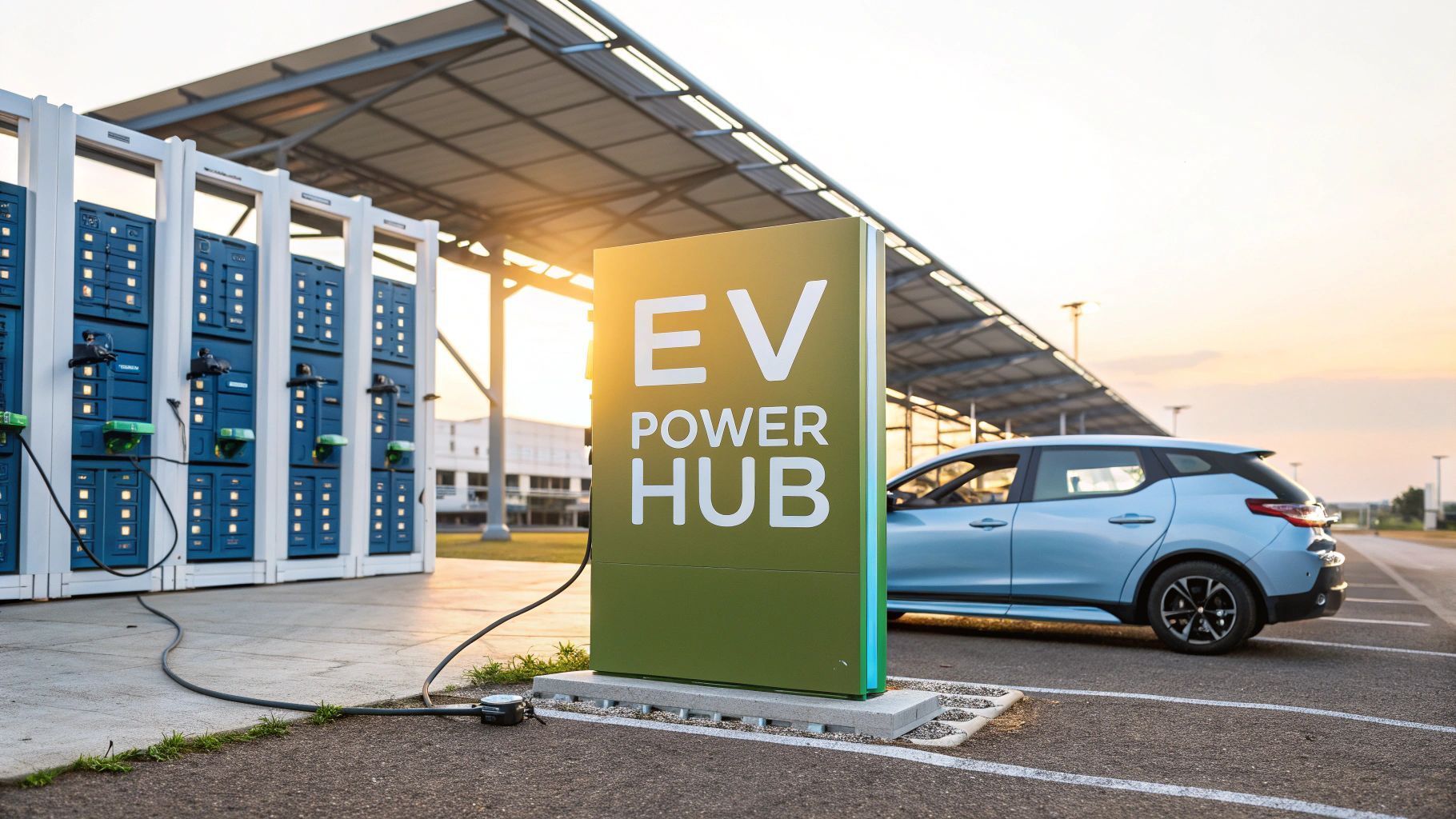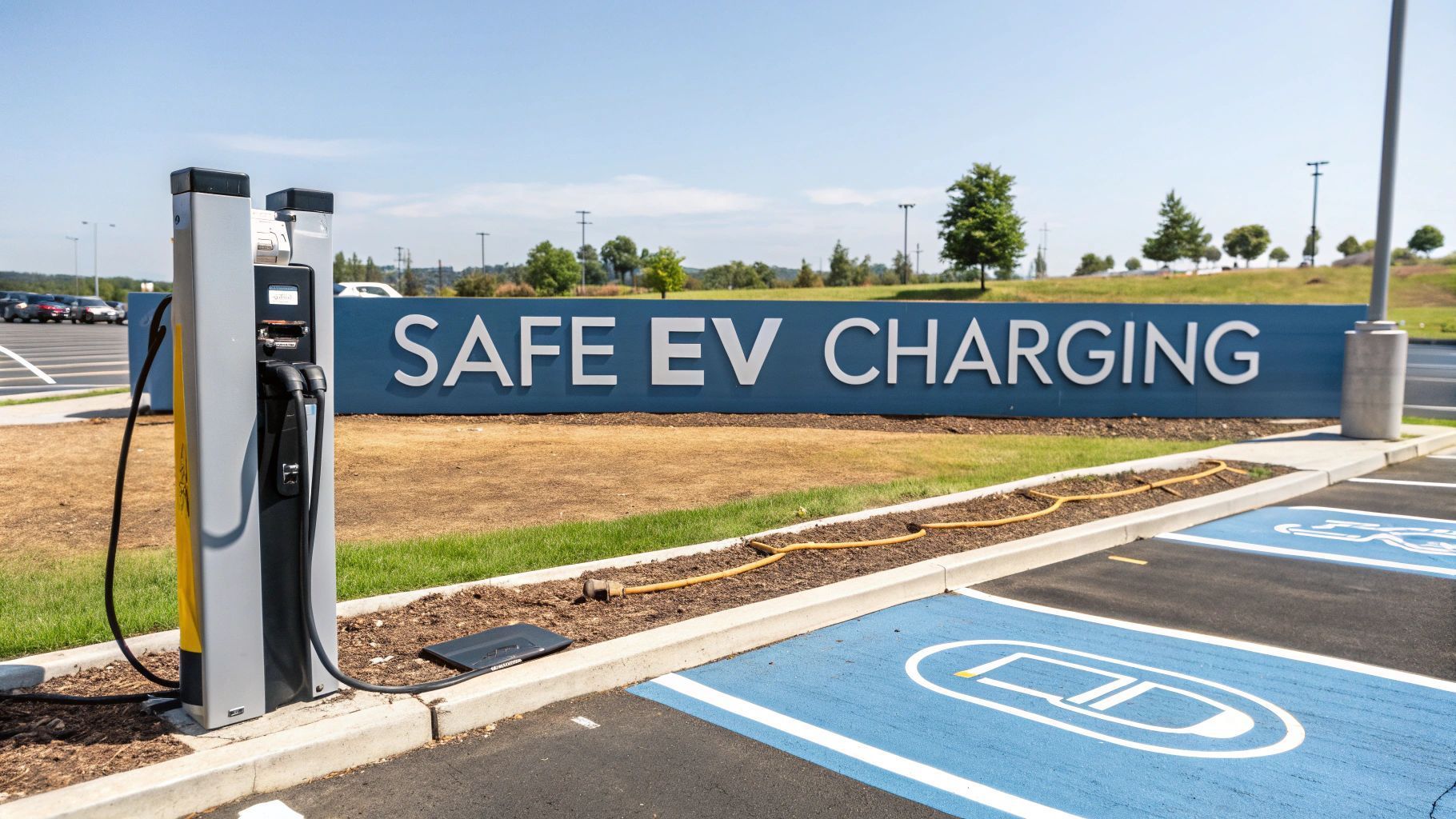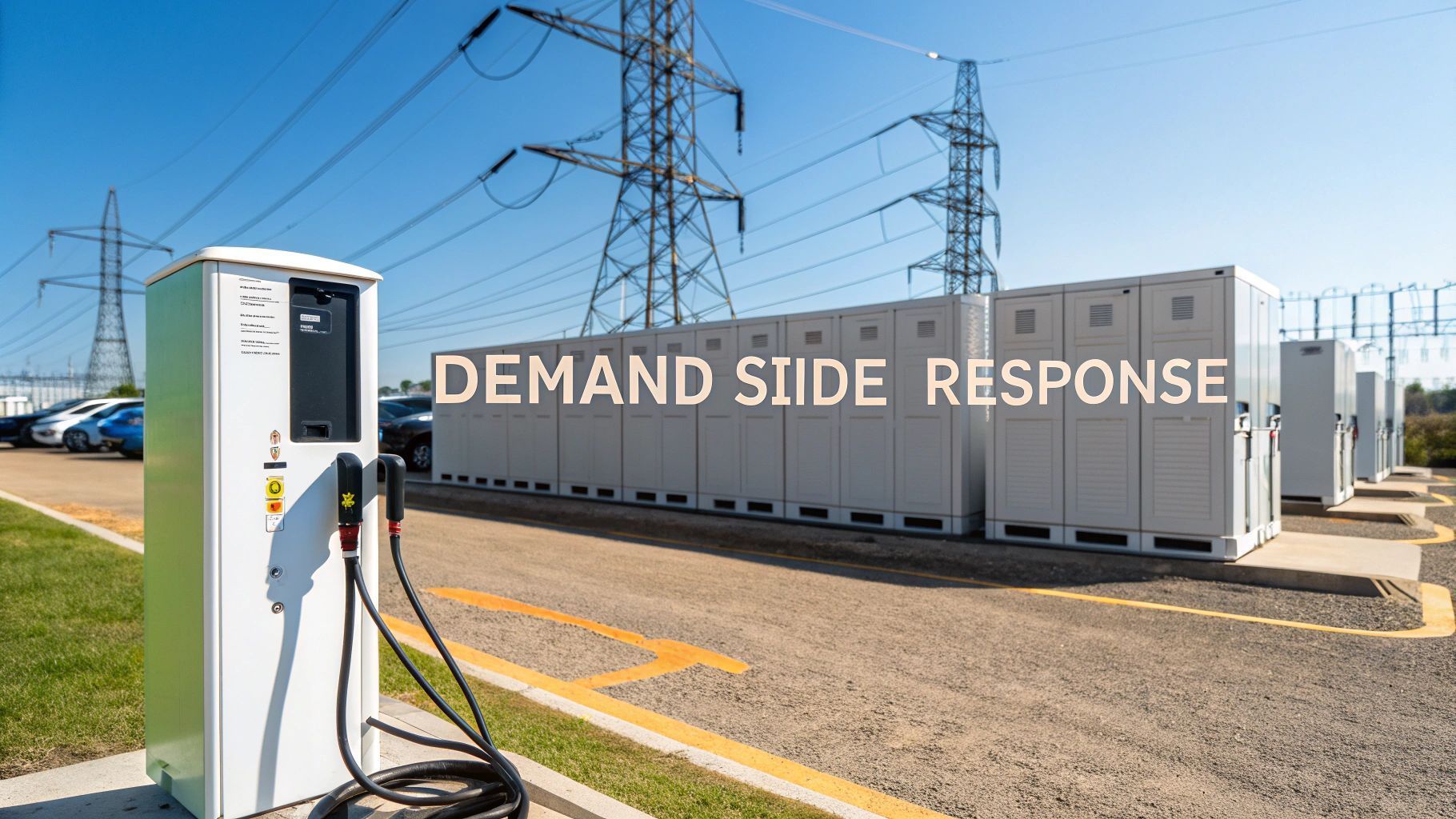UK EV Charging Stations Manufacturers You Should Know
The UK's shift to electric vehicles is gathering pace and that means one thing: a massive demand for reliable charging infrastructure. At the heart of this transition are the EV charging stations manufacturers , the companies designing and building the hardware that will power the nation's growing fleet of electric cars. Their work is absolutely critical if we are going to meet our national electrification targets.
Understanding the UK’s EV Charging Revolution
The rise in EV ownership is impossible to ignore, putting huge pressure on the UK to build out a robust and accessible charging network. This is not just about sticking a few chargers in city centres; it is about creating a sophisticated ecosystem. We need everything from convenient home units for overnight top-ups to powerful rapid chargers along motorways that make long-distance travel a reality.
This surge in demand has kicked off a dynamic and competitive market. The leading manufacturers are not just churning out hardware. They are on the front lines, actively shaping the future of British transport and energy.
The scale of this growth is staggering. In 2024 , the UK's electric vehicle charging infrastructure market was already worth around USD 1.04 billion . Forecasts project that figure to skyrocket to USD 3.79 billion by 2030 – a near fourfold expansion in just six years.
Why Choosing the Right Manufacturer Matters
For businesses, local councils and even individual drivers, picking the right manufacturer is a major strategic decision. It is a choice that directly impacts reliability, the ability to scale up and the long-term running costs of your charging setup. It goes far beyond the initial purchase price. If you want to get a better handle on the full financial picture, including both home and commercial projects, you can find great information on EV charging station installation costs.
When you are weighing up your options, you need to be asking some tough questions:
- Technological Advancement: Are they pushing the envelope with solutions for rapid EV charging, mobile EV charging or even EV charging from constrained grid connections?
- Integrated Systems: Do they offer a complete package combining on-site renewables like solar panels with grid-scale batteries and distributed energy systems?
- Future-Proofing: Is their technology built to last? You need hardware that can adapt to future demands, like vehicle-to-grid capabilities.
At the end of the day, the right manufacturing partner gives you the foundation for a successful and sustainable EV charging strategy.
Decoding the Different Types of EV Chargers
Trying to get your head around EV charging technology can feel a bit like learning a new language but once you break it down, understanding the different chargers that EV charging stations manufacturers offer is actually quite simple. Each type is built for a specific job, whether that is a slow overnight top-up at home or a lightning-fast charge on a long road trip.
A simple way to think about it is like filling a water bottle. A slow home charger is your kitchen tap—steady and reliable. A fast charger is more like a garden hose and an ultra-rapid charger? That is a firefighter's hose. They all get the job done but at vastly different speeds.
This image gives you a great visual breakdown of the chargers you will come across, from the small units you might have at home to the powerful public stations dotted along motorways.
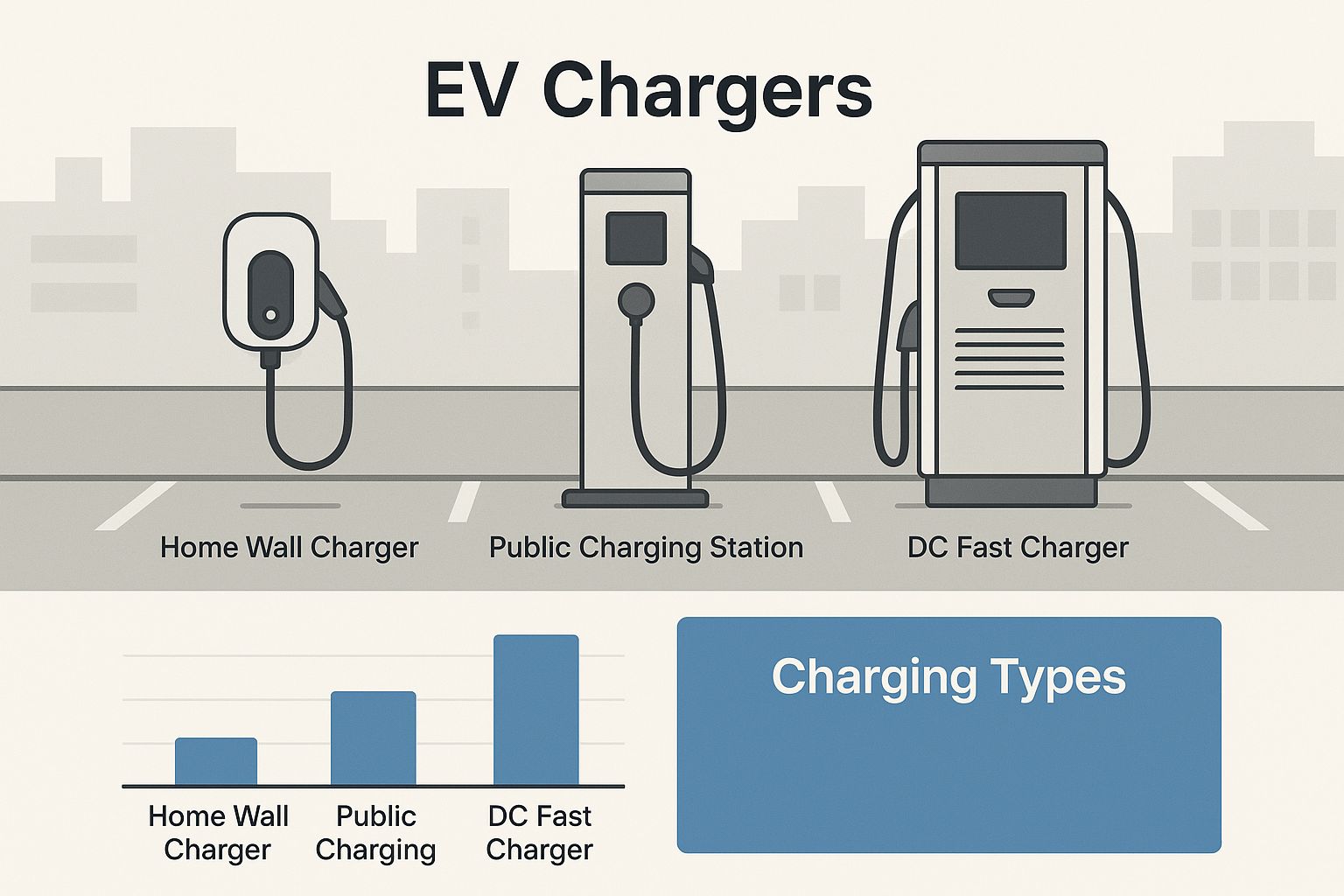
You can see the clear jump in hardware and power, which shows how manufacturers cater for all sorts of charging needs in different places.
Slow and Fast AC Chargers
The most common charger you will encounter is the AC (Alternating Current) charger. These are the ones typically found at home or in workplace car parks. Slow chargers, usually rated between 3-7kW , are perfect for plugging in overnight, making sure your car is fully charged and ready for the next day. As you look into this, it is worth understanding the cost to install a home EV charger and what that involves.
Fast AC chargers are a decent step up, delivering between 7kW and 22kW . You will often spot these at supermarkets, gyms and retail parks. They are ok for adding a some range while you are off doing something else for a minimum of a few hours.
AC chargers work by using the car's own on-board converter to turn AC power from the grid into the DC power the battery needs. This is a key reason why their charging speed is limited by the car's internal technology, not just the charging point itself.
Ultra-Rapid DC Chargers
When it comes to long-distance travel, DC (Direct Current) chargers are the real game-changers. These are the heavyweights of the public charging network, delivering power at speeds of 50kW and way beyond. Unlike their AC counterparts, they bypass the car's converter and feed DC power straight into the battery.
This direct connection is what allows for seriously impressive charging speeds. Modern ultra-rapid chargers can pump out 150kW, 350kW or even more. This technology can add hundreds of miles of range in less than 30 minutes , finally making EV road trips just as convenient as pulling into a petrol station. To see this in action, you can dig deeper into the world of ultra-rapid EV charging and see why it is so vital for busy locations. Even better are battery backed chargers as they can deliver more consistent charging speeds than grid tied chargers. They can also guarantee as the consumer you pay less for energy and for the operator higher margins.
To bring it all together, here is a practical look at how these chargers compare.
A Practical Comparison of EV Charger Types
This table breaks down the key differences between the main charger types you will find across the UK, helping you see where each one fits in.
| Charger Type | Power Output (kW) | Typical Charging Time (Full Charge) | Primary Use Case |
|---|---|---|---|
| Slow AC | 3kW - 7kW | 8-12 hours | Home overnight charging, workplace parking |
| Fast AC | 7kW - 22kW | 3-8 hours | Public car parks (supermarkets, gyms), destinations |
| Rapid DC | 50kW - 150kW | 30-60 minutes | Motorway services, public charging hubs |
| Ultra-Rapid DC | 150kW+ | 20-40 minutes | Major travel routes, dedicated charging forecourts |
As you can see, choosing the right charger really boils down to how and where it will be used.
- Home/Workplace: Slow AC chargers are the most cost-effective solution for regular, overnight or all-day charging.
- Destinations: Fast AC chargers are ideal for topping up your battery while you are at a shopping centre or out for a meal.
- Motorways/Hubs: Ultra-rapid DC chargers are absolutely essential for making long-distance EV travel practical and for serving high-traffic areas efficiently. These are increasingly in other locations such as stations, pubs and fast food outlets.
How to Choose the Right Manufacturer
Picking an EV charging station manufacturer is one of those critical, long-term decisions that goes way beyond the initial price tag. The right partner gives you more than just hardware; they provide the foundation for your future growth and operational stability. Who you choose will ripple through every part of your business, from customer satisfaction, your available grid connection and right down to your ability to adapt in a fast-changing energy world.
Think of it like choosing an architect for a new building. You would not just go with the cheapest plans. You would look for a solid reputation, a forward-thinking vision and the confidence that the structure will still be standing strong in a decade. It is exactly the same logic here. The first pillar of a smart investment is a manufacturer known for producing durable, dependable hardware that just works. Additionally one that can guarantee the maximum margin and the most flexibility for customers.
But the hardware is only half the story. The software is the brain of the whole operation. Modern charging infrastructure leans heavily on intelligent software to handle payments, keep an eye on performance and communicate with drivers.
Assessing Technical and Support Capabilities
One non-negotiable technical requirement is OCPP (Open Charge Point Protocol) compliance. This standard is your get-out-of-jail-free card, ensuring your hardware can talk to any compliant management software out there. It gives you the freedom to switch network providers down the line without being forced into an expensive, rip-and-replace hardware upgrade.
Just as important is how the manufacturer handles support and maintenance. When a charger goes down—and sooner or later, one will—you need a responsive partner who can diagnose the problem and get it fixed, fast. Every minute of downtime is lost revenue. Look for companies that offer robust maintenance agreements and have a proven track record of excellent support right here in the UK.
Choosing a manufacturer is about building a partnership. You need a company that not only supplies reliable equipment but also provides the long-term support and technical foresight needed to ensure your investment delivers sustained value for years to come.
Identifying Forward-Thinking Manufacturers
The best ev charging stations manufacturers are not just selling today's technology; they are already building the solutions for tomorrow's energy grid. Their product roadmaps should show a deep understanding of where the energy ecosystem is heading, with a clear focus on smart charging that allows speeds to be adjusted based on grid demand.
Crucially, you need to look for genuine expertise in integrating chargers with other energy assets. This is where the real magic happens. This includes:
- Grid-scale batteries that can power rapid EV charging even when the local grid connection is weak.
- On-site renewables like solar panels to generate your own clean, low-cost electricity for charging.
- Vehicle-to-grid (V2G) capabilities, which turn EVs into mobile power sources that can send energy back to the grid during peak times.
- Mobile EV charging solutions for when you need flexible deployment or emergency power on the go.
A manufacturer that excels in these areas is not just a hardware supplier; they are a true energy technology partner. They provide the tools to create a distributed energy system, turning a simple car park into a dynamic energy hub. This is the forward-thinking approach that separates a good supplier from a great strategic partner, ensuring your infrastructure stays relevant and profitable for the long haul.
Profiling the UK's Leading Manufacturers
The UK’s EV charging scene is a fascinating mix of global heavyweights and nimble British innovators. For anyone looking to invest in charging infrastructure, getting to grips with the key EV charging station manufacturers is the first step. Each brings something different to the table, from simple home smart chargers to the complex rapid-charging hubs popping up across the country.
And the market itself is absolutely booming. By the end of 2025, the UK's electric vehicle charging equipment market is expected to hit roughly 64,360 units . That reflects a compound annual growth rate of an incredible 21.32% , a clear sign of the intense investment pouring in from companies both here and abroad. You can dig into more of this data over on Mordor Intelligence's website.
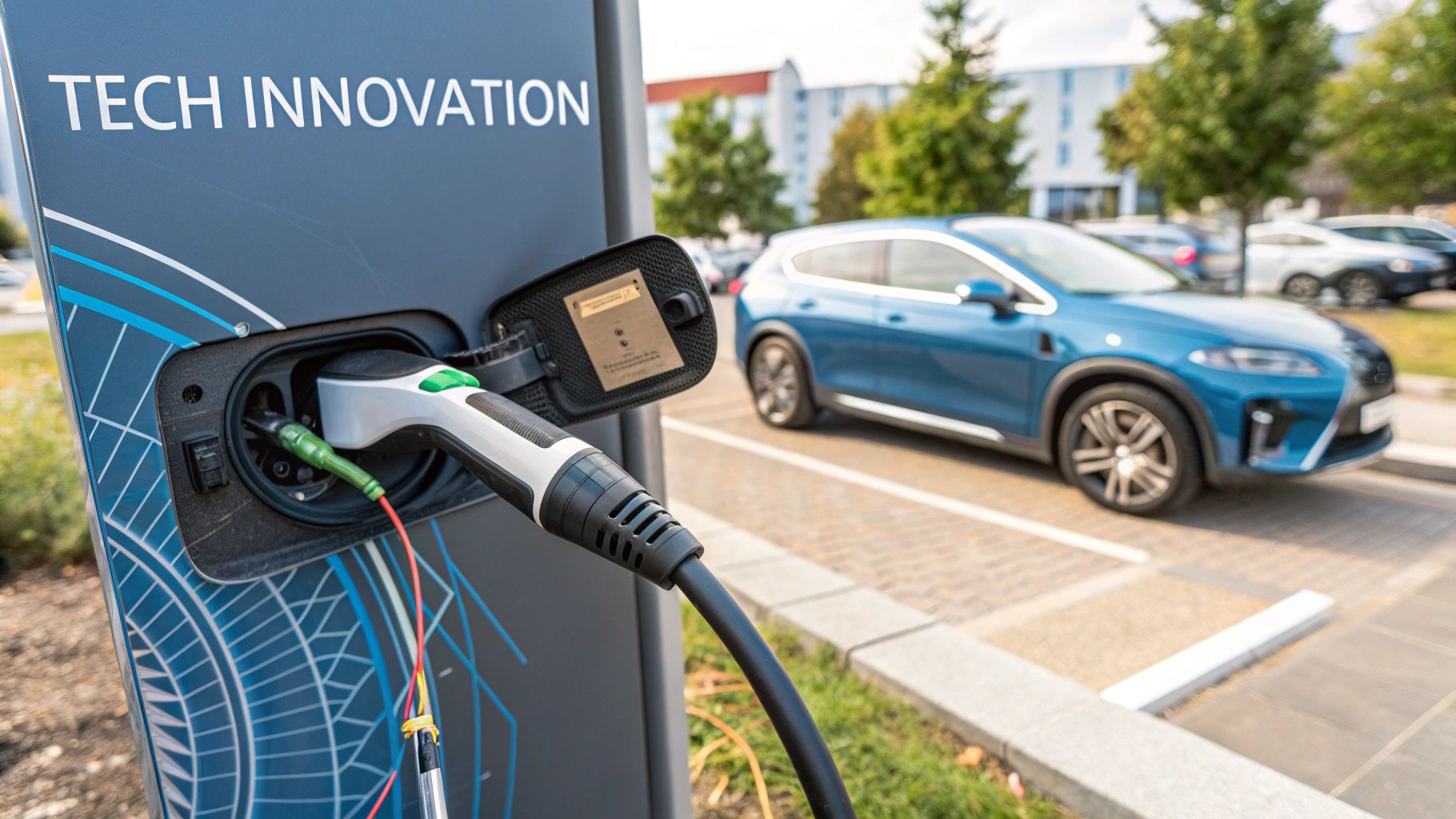
This expansion is being driven by a diverse lineup of companies, all carving out their own niche. Some are giants from the electrical equipment world, using their decades of manufacturing experience to produce reliable hardware at scale. Others are specialists, focused entirely on pushing the boundaries of EV technology.
Key Players in the UK Market
When you look closely at the landscape, a few distinct types of manufacturers start to emerge. Each one serves a different part of the wider EV infrastructure puzzle.
- Global Industrial Leaders: These are the big, established multinational names. They often offer a huge range of solutions, from home units to powerful DC chargers. Their main strengths? Massive manufacturing capacity, global supply chains and a reputation for reliability built over years.
- Specialist UK Innovators: In contrast, you have homegrown British firms that are laser-focused on solving uniquely UK problems. Many are leading the way in areas like pulling rapid EV charging from a constrained grid, developing mobile EV charging or integrating large-scale batteries with renewable power.
- Software-Led Companies: Some manufacturers set themselves apart with their advanced software. They are not just selling a box; they are providing the brains behind large charging networks, enabling smart charging, seamless payments and intelligent energy management.
The best manufacturers today understand they are not just selling hardware. They are delivering a complete energy solution. It is about integrating the charge point with battery storage and other distributed energy resources to build a system that is robust and ready for the future.
Ultimately, choosing a partner means looking beyond the charger itself. You need to assess their expertise in these connected technologies. This is especially true for any business wanting to roll out rapid charging without getting hit by crippling grid upgrade costs.
Solving Grid Constraints with Battery Storage
One of the biggest hurdles holding back a widespread rollout of rapid EV charging is not the charger technology itself. It is the local electricity grid. Many of the most logical places for chargers—think rural service stations or busy city-centre car parks—simply do not have the heavy-duty grid connections needed to power ultra-rapid charging speeds.
Traditionally, the only way forward was a costly and painfully slow grid upgrade, a process that could easily drag on for months, if not years. This single barrier has stopped countless charging projects in their tracks but today, pioneering EV charging stations manufacturers are getting around this problem altogether by building batteries directly into their charging systems.
The Power of On-Site Battery Storage
Picture a large on-site battery as a local energy reservoir. It can slowly fill itself up throughout the day, drawing power from even a weak grid connection without causing an overload. It is a bit like filling a massive water butt with a garden hose; it takes time but eventually, the tank is full and ready.
Then, when an EV driver plugs in, the system unleashes all that stored energy in a powerful, high-speed burst, delivering a genuinely rapid charge. This neatly sidesteps the local grid's limitations. The battery acts as a buffer, turning a trickle of electricity into a torrent of power, right when it is needed most.
This approach means that ultra-rapid charging is no longer restricted to sites with perfect grid access. It unlocks thousands of new locations, making fast, reliable charging possible almost anywhere, from remote countryside spots to dense urban hubs.
This technology is the key to creating a truly distributed energy system where power is stored and used locally. To see how this works in practice, you can learn more about how our battery storage systems are powering the UK’s EV revolution.
Beyond Grid Support to Energy Hubs
The most forward-thinking manufacturers are taking this idea even further. They are now building complete energy hubs that combine battery storage with other on-site resources. These systems are designed to be much more than just car chargers; they are active, intelligent parts of the modern energy grid.
These advanced capabilities include:
- Renewable Integration: By connecting the battery to on-site renewables like solar panels, the system can capture and store clean, low-cost energy generated during the day. This stored solar power can then be used to charge vehicles at any time, day or night.
- Mobile EV Charging: The same battery technology can be put on wheels. This creates mobile EV charging units that can provide emergency power or temporary charging at events, with no need for any grid connection at all.
- Grid Services: These battery-integrated systems can also provide services back to the grid. By helping to balance supply and demand, they can generate extra revenue streams for the site owner, turning a cost centre into a profit centre.
By cracking the grid connection puzzle, manufacturers are not just making EV charging more accessible. They are building the intelligent, flexible energy infrastructure that will underpin the UK’s transition to an all-electric future.
Spotlight on ZPN Energy's Unique Approach
In a crowded market, ZPN Energy carves its own path. As a proudly British company, we do not just assemble parts—we design and build our EV charging solutions right here in the UK, tackling the nation's specific energy challenges head-on. Our real expertise lies in solving what is arguably the biggest headache in deploying rapid charging: the grid.
We have focused our efforts on creating powerful rapid and even mobile EV charging systems that do not need a high-capacity grid connection to work. The secret is our deep integration of modular, distributed and grid-scale batteries directly into the hardware. This is not just a feature; it is a direct answer to the constrained grid connection issues that so often delay or even kill charging projects before they begin.
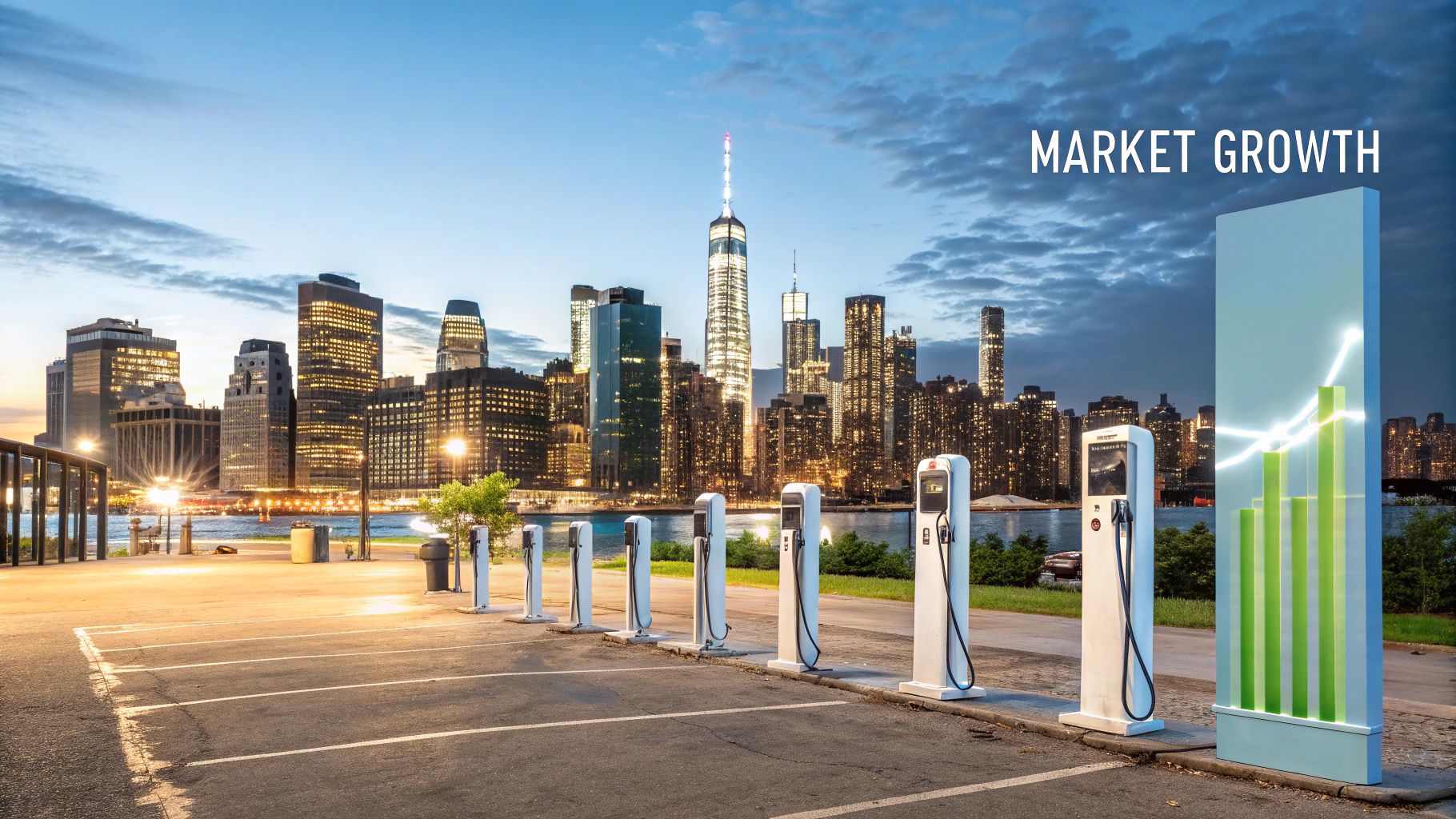
End-to-End British Innovation
What truly makes ZPN Energy a strategic partner is our complete control over the entire process. From the initial hardware concept and manufacturing to the sophisticated software that brings it all to life, everything is handled in-house. It is this end-to-end British approach that gives us total command of quality and the agility to innovate quickly.
Our systems are engineered to function as miniature, self-reliant energy hubs. They cleverly weave together several key technologies:
- Rapid EV Charging: Delivering the high-speed power that modern EV drivers demand.
- Integrated Batteries: Storing energy to bypass grid limitations and charge vehicles faster than the grid connection would normally allow.
- Distributed Energy: Creating localised power sources that reduce the strain on the national grid.
- On-site Renewables: Seamlessly incorporating solar to generate clean, low-cost electricity right where it is needed.
By mastering the synergy between EV charging and batteries, ZPN Energy empowers businesses to install ultra-rapid chargers quickly and cost-effectively, even in locations previously considered unviable. This turns a simple charging point into a valuable, future-proofed energy asset.
This integrated model is perfectly showcased in our advanced systems. Businesses looking to provide top-tier charging can explore solutions like the ZPN HUBZ for unleashing ultra-rapid DC charging , all without getting bogged down by expensive and time-consuming grid upgrades. This capability makes us more than just a supplier; it makes us a vital partner in building the UK's modern energy infrastructure.
Your Questions Answered
Stepping into the world of EV charging can bring up a lot of questions. Let us clear up some of the most common ones about EV charging station manufacturers and their technology, so you can make decisions with confidence.
Operator vs. Manufacturer: What's the Difference?
It is really important to know who does what. A manufacturer designs and builds the physical charging hardware and the software that makes it tick. Think of them as the architects and engineers creating the tools for the job.
A charging operator, on the other hand, is the one who installs and manages networks of these chargers for everyone to use. They handle the day-to-day running of things, like billing and maintenance. Getting the manufacturer choice right is the critical first step to building a charging network you can rely on.
Why Is OCPP Compliance So Important?
OCPP, or the Open Charge Point Protocol, is basically a universal language that lets charging hardware talk to any management software that also speaks it. It is an absolutely vital feature to look for.
Choosing an OCPP-compliant manufacturer means you are never locked into a single, proprietary system. It gives you the freedom to switch network providers down the line without having to rip out and replace all your expensive hardware.
This flexibility is what future-proofs your investment. It puts you in control of your long-term costs and strategy, instead of leaving you tied to one provider for the life of your equipment.
Can I Install Rapid Chargers with a Poor Grid Connection?
Yes, you absolutely can, provided you have the right technology. This used to be a massive hurdle but leading manufacturers have cracked the code by integrating large on-site batteries directly into their charging stations.
This smart setup allows the unit to slowly 'trickle charge' its internal battery from a weak grid connection over several hours. Then, when a car plugs in, it unleashes all that stored energy at high power for a rapid charge. It is a brilliant way to bypass the need for costly and slow grid upgrades, making rapid charging possible almost anywhere.
Ready to overcome your grid limitations and deploy powerful EV charging? ZPN Energy designs and manufactures cutting-edge rapid charging and battery storage solutions right here in the UK. Discover our technology today by visiting https://www.zpnenergy.com.


